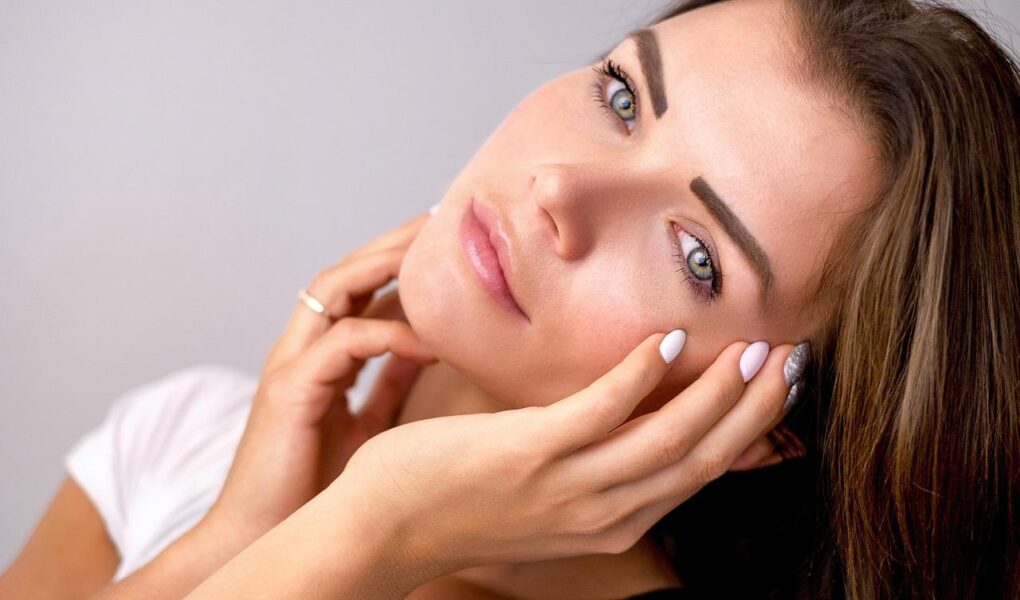Contents
What you eat has an effect on the condition of your skin – some foods will cause damage, and some will be beneficial. And given that your skin is your largest organ, it’s worth taking care of it from the inside out. By including four vitamins in your diet and four skincare products in your beauty routine, you can achieve healthy skin that glows.
Top Vitamins To Feed The Skin
Vitamins C, D, E and K are essential vitamins for the skin as they help to reduce dryness, rough or red patches, dark spots and wrinkles. Vitamins provide antioxidant action, keeping your skin looking youthful and bright.
Vitamin C
As well as being found in the outer layer of the skin, vitamin C is found in citrus fruits (oranges, grapefruits, lemons and limes), carrots, bell peppers, broccoli and spinach.
This vitamin boosts the production of collagen that supports the connective tissues and aids cellular processes. It also helps to slow cell damage and speeds up the healing of wounds.
You will often find vitamin C in many skincare products, but it is worth making sure that you get 1,000mg of this vitamin in your diet every day since topical products won’t support your bones, cartilage and teeth.
Vitamin D
Vitamin D can be found in breakfast cereals, yoghurts, eggs, mushrooms, salmon, cod, tuna, milk and orange juice.
This vitamin functions as a steroid, stimulating and regulating cell generation to calm inflammation that otherwise worsens acne, rosacea and eczema. Without approximately 600IU of this vital vitamin a day, our poor immune function suffers, weakening the skin, increasing dryness, and escalating the risk of infection.
Vitamin D production is also triggered within our skin by exposure to UV light. Spending 10 minutes in the sunshine every day can help with vitamin D synthesis, but since our weather is unpredictable in the UK, it is important to increase our daily intake through our diet. We must also remember to wear sunscreen all year round to avoid damage to the skin by the sun’s rays.
Vitamin E
Found in beetroot, avocados, mangos, kiwifruit, nuts and seeds, vitamin E is an antioxidant that helps to protect the skin against damage from the sun. Making sure that we get 15mg of vitamin E a day can help to prevent wrinkles and dark spots.
Vitamin E helps to boost the production of sebum that conditions the skin, preventing dryness and soothing inflammation. However, take care not to exceed the recommended amount as too much of this vitamin can build up to a toxic level.
Vitamin K
Leafy greens like kale, spinach, cabbage and lettuce contain vitamin K, but this nutrient can also be found in green, soy and edamame beans, asparagus, pumpkin, pinenuts and blueberries.
We need 90-120ug of this vitamin a day to assist in the healing of wounds and the improvement of scars, stretch marks, spider veins, dark spots and dark circles under the eyes.
Other Useful Nutrients
Fatty acids, such as omega-3 and -6, can be found in oily fish like salmon, herring, sardines, flaxseed oil and extra virgin olive oil. We need 250-300mg of these essential fatty acids a day, and they must be included in our diet as our body cannot produce them naturally. As well as making the skin more elastic, fatty acids keep moisture locked in and irritants out.
We also need to maintain adequate hydration levels as water and other fluids help with circulation and the purging of toxins from the skin. It is recommended that we drink around eight glasses of water every day. This could include or be on top of fruit juices, milk, tea and coffee, although in particular, the juice from watermelon, pomegranates and cucumbers are beneficial as they are packed with antioxidants.
Foods To Avoid
We won’t lecture you on the effects of caffeine, alcohol and tobacco, but we will explore some of the typical foods that we consume every day without much thought and offer some easy alternatives.
Sugar
Refined sugar causes us to produce more oil, which clogs our pores. Instead, consider using small amounts of natural sweeteners like raw honey or maple syrup that are less likely to trigger a breakout of acne.
Dairy
Dairy has a tendency to make inflammatory conditions like eczema and acne worse. Cow’s milk could be replaced with cashew, coconut or oat milk. There is also an increasing selection of dairy-free products like cheese, cream, and yoghurts in the supermarkets that would have a less negative effect on your complexion.
Fast Food
While convenient when we are on the go, fast food is full of trans-fats that cause skin conditions to flare up. Instead, try to keep vegetable snacks, fruit, nuts, seeds and protein bars handy to munch on between meals.
Must-Have Skincare Products
Different skin care products nourish and protect the skin in different ways. For example, a cleanser removes dirt and bacteria, while a toner restores the skin’s pH. An exfoliant removes dead skin cells, making way for fresh ones to take their place, and a moisturiser tops up the skin’s moisture level. You may not need all of these products, but there are four that you shouldn’t go without.
Face Cream
A face cream will moisturise and even your skin tone. Get one that is lightweight but that contains active ingredients, such as vitamins B3, C and E, as well as jojoba oil to prevent and reduce fine lines. This is top of the list because it should be applied every morning and every night to protect your skin from seasonal weather that dries out your skin all year round.
Face Oil
To feed your skin with fatty acids, use a face oil that is fast-absorbing. If it contains vitamins C and E, then that’s even better as these will help to nourish and soften the skin. As well as being great moisturisers that keep your skin supple, facial oils contain antioxidant properties that help to fight off free radicals and prevent wrinkles.
Eye Serum
We often forget to include our eyes in our skincare routine, but this is where the first signs of ageing appear. An eye serum is a concentrated formula that penetrates deep into the delicate skin around the eyes, providing nutrition and moisture. Choose a product with antioxidants and hyaluronic acid that make the skin firmer. If your eye serum contains caffeine, this will help to reduce puffiness and remove dark circles, lessening the appearance of wrinkles.
Sunscreen
Since it is difficult to avoid the sun altogether, and in fact, some regular exposure is essential for the creation of vitamin D, sunscreen is an essential product to use every day regardless of how sunny it is. UV light will still penetrate the heaviest of cloud cover and is able to get through glass (about 50% of UVA rays).
To reduce the risk of skin cancer and skin damage, you should use a broad-spectrum sunscreen with an SPF of 30 or more every day. Sunscreen should also be reapplied every two hours to any skin that is exposed.
The Takeaway
A healthy complexion reflects a healthy body and lifestyle, and skin that is taken care of will take care of you later in life without giving away your age. While eating a sensible diet and drinking plenty of water nourishes our skin from the inside, skincare products help to take care of our skin from the outside.


